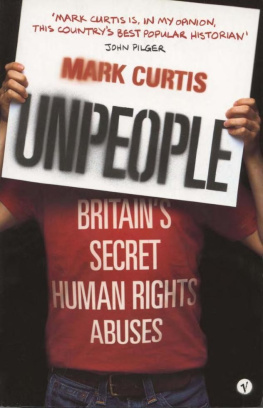Mark. Curtis is a former Research Fellow at the Royal Institute of International Affairs (Chatham House) and has written extensively on British and US foreign policies. His hooks include The Ambiguities of Power: British Foreign Policy since 1945 (Zed, London, 1995); The Great Deception: Anglo-American Power and World Order (Pluto, London, 1998); Trade for Life: Making Trade Work for Poor People (Christian Aid, London, 2001); and Web of Deceit: Britain's Real Role in the World (Vintage, London, 2003). He has worked in the field of international development for the past eleven years and is currently Director of The World Development Movement. His website is:
www.markcurtis.info.
UNPEOPLE
BRITAIN'S SECRET HUMAN RIGHTS ABUSES

This eBook is copyright material and must not be copied, reproduced, transferred, distributed, leased, licensed or publicly performed or used in any way except as specifically permitted in writing by the publishers, as allowed under the terms and conditions under which it was purchased or as strictly permitted by applicable copyright law. Any unauthorised distribution or use of this text may be a direct infringement of the author's and publisher's rights and those responsible may be liable in law accordingly.
ISBN 9781409020028
Version 1.0
www.randomhouse.co.uk
Published by Vintage 2,004
2 4 6 8 10 9 7 5 3 1
Copyright Mark Curtis 2004
Mark Curtis has asserted his right under the Copyright,
Designs and Patents Act 1988 to he identified as the
author of this work
This electronic book is sold subject to the condition that it shall not by way of trade or otherwise, be lent, resold, hired out, or otherwise circulated without the publisher's prior consent in any form other than that in which it is published and without a similar condition including this condition being imposed on the subsequent purchaser
First published in Great Britain by
Vintage, 2.004
Vintage
Random House, 20 Vauxhall Bridge Road,
London swiv 2SA
Random House Australia (Pty) Limited
20 Alfred Street, Milsons Point, Sydney,
New South Wales 2061, Australia
Random House New Zealand Limited
18 Poland Road, Gienfield,
Auckland to, New Zealand
Random House South Africa (Pty) Limited
Endulini, 5A. Jubilee Road, Parktown 2193. South Africa
Random House UK Limited Reg. No. 954009
www.randomhouse.co.uk
A CIP catalogue record for this book
is available from the British Library
ISBN: 9781409020028
Version 1.0
INTRODUCTION
This book is an attempt to uncover the reality of British foreign policy since the invasion of Iraq in 2003. It also analyses several major episodes in Britain's past foreign policy, exploring in detail formerly secret government files which have been ignored by mainstream commentators. They expose the truth behind British governments' supposed commitment to grand principles such as human rights, democracy, peace and overseas development.
Britain is bogged down in an unpopular occupation in the Middle East, the state has become widely distrusted by the public, accusations of spying on the UN have further undermined its international role, while Britain has effectively been marginalised in the EU. Seen from within the establishment, Tony Blair has become the greatest public liability since Anthony Eden, whose mistake was not his invasion of a foreign country (normal British practice) but his defeat, in the Suez crisis of 1956.
Massive public opposition to the invasion of Iraq has troubled the government and may prove to have deterred it from other ventures. Yet the course of New Labour's foreign policy since the invasion has been disastrous in terms of human rights, and is continuing to occur outside any meaningful democratic scrutiny.
British foreign policy is guided by a tiny elite not just the handful of ministers in successive governments, but the civil servants, ambassadors, advisers and other unaccountable Whitehall mandarins around them, who set the country's agenda and priorities, and define its role within the world. Since March 2003, these decision-makers have been implementing a series of remarkable steps: first, Britain is deepening its support for state terrorism in a number of countries; second, unprecedented plans are being developed to increase Britain's ability to intervene militarily around the world; third, the government is increasing its state propaganda operations, directed towards the British public; and fourth, Whitehall planners have in effect announced they are no longer bound by international law.
The principal victims of British policies are Unpeople those whose lives are deemed worthless, expendable in the pursuit of power and commercial gain. They are the modern equivalent of the 'savages' of colonial days, who could be mown down by British guns in virtual secrecy, or else in circumstances where the perpetrators were hailed as the upholders of civilisation.
The concept of Unpeople is central to each of the past and current British policies considered in this book. Through its own intervention, and its support of key allies such as the United States and various repressive regimes, Britain has been, and continues to be, a systematic and serious abuser of human rights. I have calculated that Britain bears significant responsibility for around 10 million deaths since 1945 (see table), including Nigerians, Indonesians, Arabians, Ugandans, Chileans, Vietnamese and many others. Often, the policies responsible are unknown to the public and remain unresearched by journalists and academics.
In this book, I aim to document for the first time the secret record of certain episodes in government planning. The declassified files to which I refer are instructive not only for the light they throw on the past. They are also directly relevant to current British foreign policy surrounding Iraq, military intervention and the 'war against terror'. British interests and priorities have changed very little over time; essentially, the only variation has been in the tactics used to achieve them.
Of the basic principles that guided the decisions taken in these files, there are three which seem particularly apposite when considering current events.
The first is that British ministers' lying to the public is systematic and normal. Many people were shocked at the extent to which Tony Blair lied over Iraq; some might still be unable to believe that he did. But in every case I have ever researched on past British foreign policy, the files show that ministers and officials have systematically misled the public. The culture of lying to and misleading the electorate is deeply embedded in British policy-making.
A second, related principle is that policy-makers are usually frank about their real goals in the secret record. This makes declassified files a good basis on which to understand their actual objectives. This gap between private goals and public claims is not usually the result, in my view, of a conscious conspiracy. Certainly, planned state propaganda has been a key element in British foreign policy; yet the underlying strategy of misleading the public springs from a less conscious, endemic contempt for the general population. The foreign-policy decision-making system is so secretive, elitist and unaccountable that policy-makers know they can get away with almost anything, and they will deploy whatever arguments are needed to do this.












